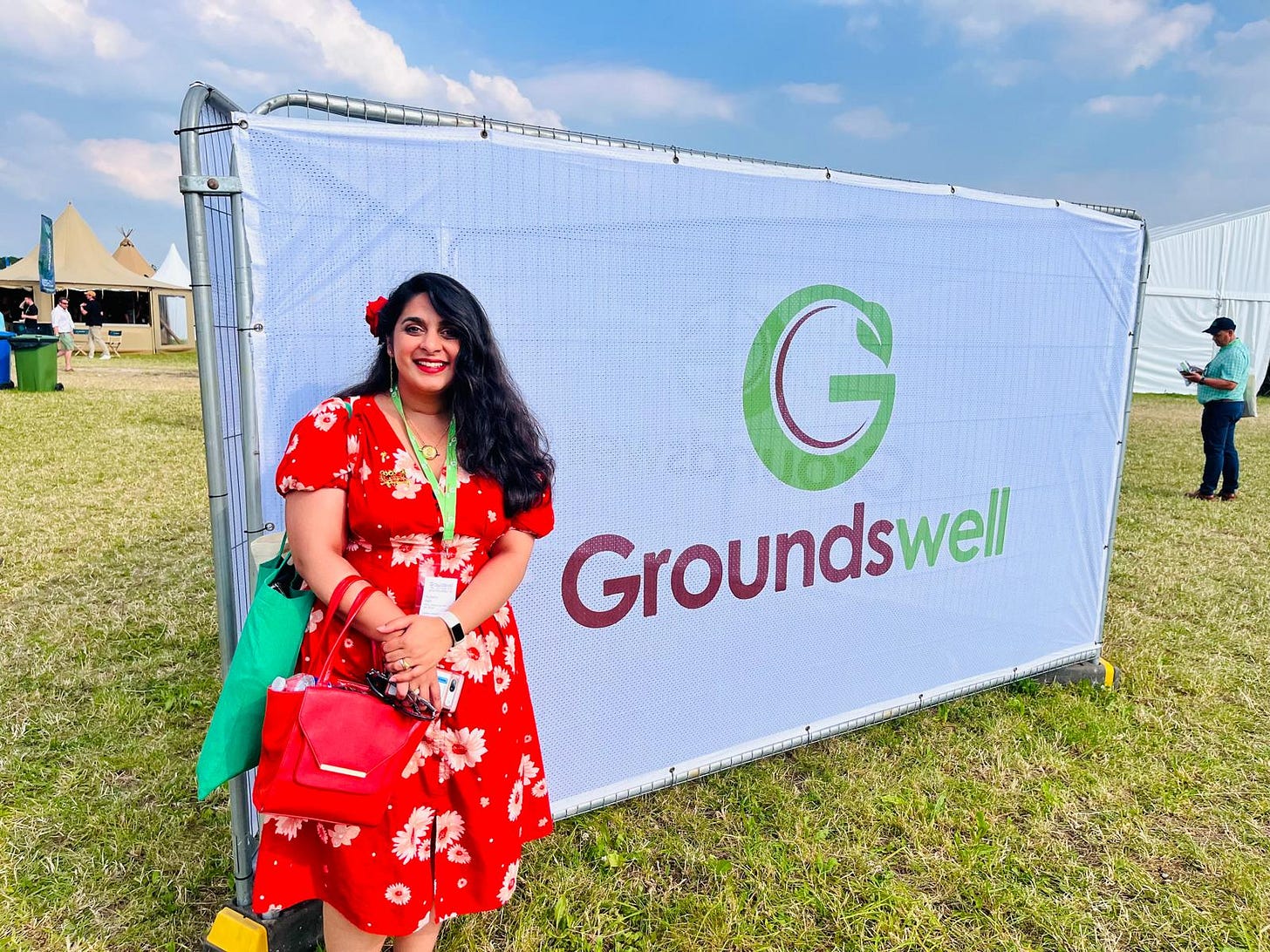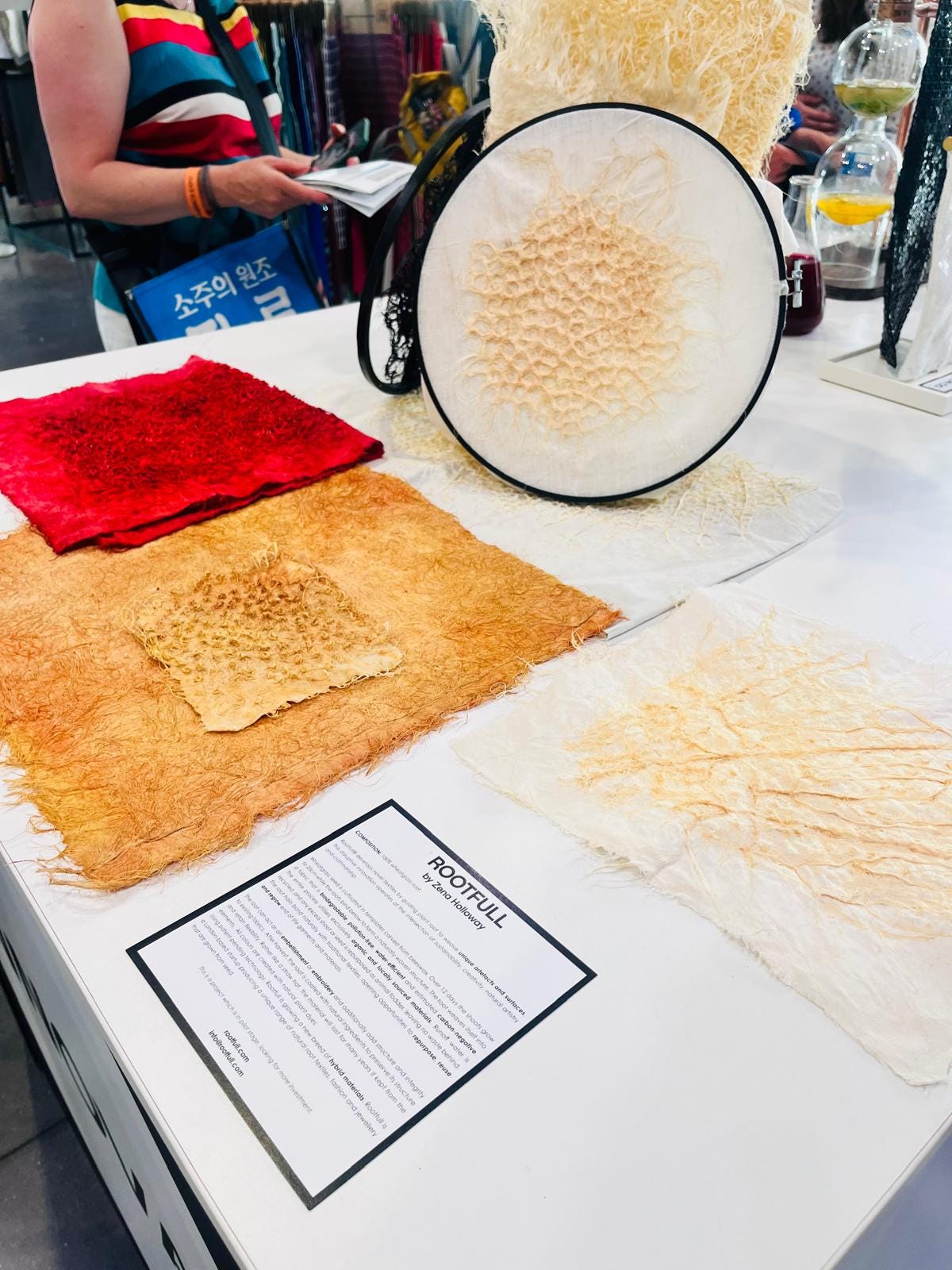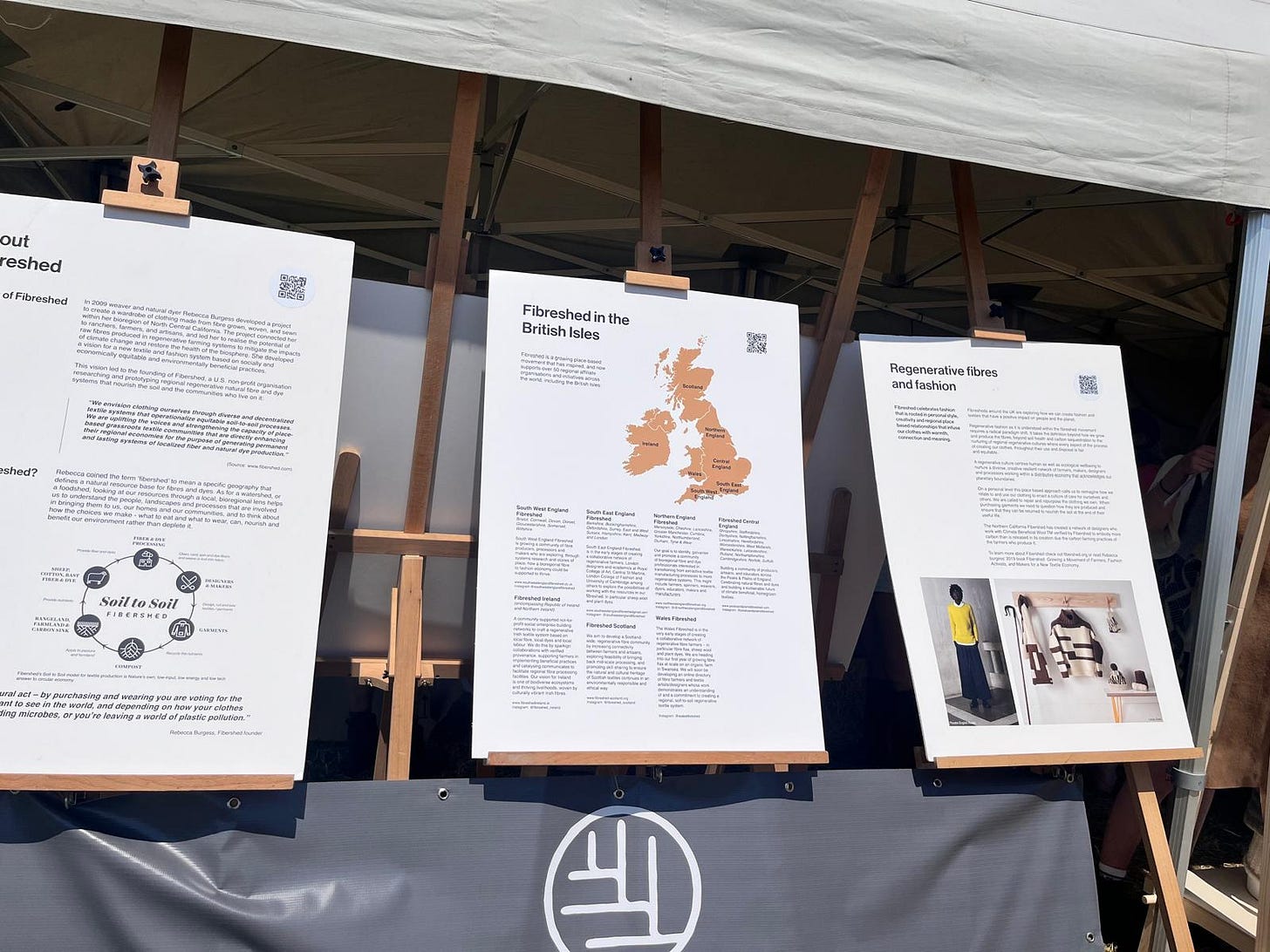Insight Into The Future Fabrics Expo: A Beacon of Sustainable Fashion
Michelle Kazi gives her low down of Future Fabrics Expo, Groundswell and Fibreshed

Attending the Future Fabrics Expo was nothing short of awe-inspiring. Representing Fashion Roundtable, I was immersed in a world of innovation and sustainability, where the future of fashion is being reshaped. The expo, brimming with exhibitors showcasing eco-friendly materials and groundbreaking practices, highlighted the tremendous potential of sustainable fashion. The energy at the expo was palpable, with passionate conversations and cutting-edge displays that challenged traditional notions of textile production.
The Role of Luxury Fashion
Luxury fashion, often perceived as a leader in setting trends, has a unique opportunity to spearhead the shift towards sustainability. Given its high-profit margins, the material cost of transitioning to sustainable alternatives is relatively minimal. Luxury brands possess the influence to redefine industry standards, promoting a supply chain that is not only sustainable but also inspirational to the broader fashion sector. The potential for luxury fashion to set a precedent is vast; by adopting sustainable practices, these brands can influence consumer expectations and encourage the entire industry to follow suit.
Moreover, the integration of sustainable practices into luxury fashion can enhance brand value and loyalty. Consumers are increasingly demanding transparency and ethical practices from their favorite brands. By meeting these demands, luxury fashion houses can differentiate themselves in a crowded market, turning sustainability into a competitive advantage. This transition can also pave the way for innovative collaborations with sustainable material innovators and local artisans, further embedding ethical practices into the brand ethos.
Meeting the DEMETER Standard
One of the standout discussions at the expo was the potential for the fashion industry to meet the DEMETER standard, a certification for biodynamic agriculture. This standard emphasizes holistic farm management, biodiversity, and ecosystem harmony. By adopting these principles, luxury fashion can ensure that its materials are grown and harvested in ways that enrich rather than deplete the environment. The DEMETER standard goes beyond organic, integrating spiritual and ethical dimensions into farming practices, which align with the luxury sector's emphasis on heritage and quality.
Incorporating the DEMETER standard into fashion production can significantly impact the entire supply chain. It encourages brands to invest in regenerative agriculture, which not only produces high-quality fibers but also contributes to soil health and carbon sequestration. This holistic approach supports local farming communities, creating a symbiotic relationship between fashion brands and the environments they rely on. By committing to such rigorous standards, the fashion industry can play a pivotal role in global sustainability efforts.
Addressing Skill Shortages
A significant challenge identified is the potential skill shortage in sustainable fashion. This is where legislation promoting craft and creative industries from an early age becomes crucial. Encouraging young people to pursue careers in fashion through education and training can bridge this gap. By fostering a new generation of skilled artisans and designers, the industry can sustain its shift towards eco-friendly practices. Early investment in creative education not only prepares the workforce of tomorrow but also instills a deep appreciation for sustainability and craftsmanship.
Government support in the form of grants and programs can stimulate interest in sustainable fashion careers. Partnerships between educational institutions and fashion houses can provide practical experience and mentorship, ensuring that students are well-equipped to enter the industry. This proactive approach can mitigate the risk of skill shortages and ensure that sustainable fashion practices are embedded in the industry's future.
Enriching the Value of Garments
Luxury fashion has the power to elevate the value of garments beyond their price tags. By embracing sustainability, these brands can produce clothing that is not harmful to the environment, thereby enriching their intrinsic value. This shift not only caters to a growing consumer demand for ethical fashion but also sets a precedent for the industry at large. Sustainable luxury garments carry stories of ethical production and environmental stewardship, making them cherished items that consumers can be proud to own.
The integration of sustainability into luxury fashion also encourages a shift towards mindful consumption. By promoting durable, high-quality garments, luxury brands can challenge the fast fashion model, which prioritises quantity over quality. This approach can foster a culture of appreciation for well-made, sustainable products, reducing waste and encouraging consumers to invest in timeless pieces.
Conclusion
The Future Fabrics Expo underscored the transformative potential of sustainable fashion, particularly if luxury brands lead the charge. With the right support and legislation, fashion can move towards a future where garments are not only luxurious but also sustainable. Fashion Roundtable is committed to promoting these changes, working alongside organisations and engaging with policymakers to mainstream sustainable fashion. Together, we can create a fashion industry that is beautiful, ethical, and environmentally responsible. The journey towards sustainable fashion is challenging, but with collective effort and unwavering commitment, it is undoubtedly achievable.
REMINDER! The General Election is this Thursday, 4th July 2024
Remember to vote and ensure you have your photo ID with you. Click here for a list of all accepted photo ID’s to ensure you are not turned away. You do not need to take your poll card with you, so don’t worry if you have lost or misplaced it

The Groundswell Event and Fibreshed: A Path to Sustainable Fashion
Last Week, representing Fashion Roundtable, our researcher, Michelle Kazi, attended Groundswell, a pivotal event dedicated to regenerative agriculture. This gathering brings together farmers, researchers, and industry leaders to discuss sustainable farming practices and innovative techniques that promote soil health, biodiversity, and carbon sequestration.
Amidst the engaging seminars and exhibitions, Michelle devoted her focus to Fibreshed, a non-profit organization championing regional and regenerative fiber systems. Fibreshed connects farmers, designers, and artisans to create sustainable, locally-sourced textile communities. Their "soil-to-soil" philosophy ensures that fibers, from their cultivation to their end-of-life, enrich the soil rather than deplete it. Natural fibers, natural dyes, and biodegradable materials are at the heart of their mission.
Fibreshed's work on wool is particularly noteworthy. They promote the use of locally-sourced wool, emphasizing its natural properties and environmental benefits. By supporting local wool farmers, Fibreshed helps to reduce waste and create a closed-loop system where wool is not discarded but rather used sustainably. Their initiatives ensure that wool production aligns with ecological practices, enhancing soil health and promoting biodiversity.
The "soil-to-soil" philosophy is central to Fibreshed’s mission, focusing on creating a circular lifecycle for textiles. This approach starts with growing natural fibers in ways that regenerate the soil, ensuring long-term agricultural health. Once the textiles reach the end of their useful life, they are designed to be composted, returning valuable nutrients back to the soil. This closed-loop system reduces waste and pollution, emphasizing the importance of natural dyes and biodegradable materials that can decompose without harming the environment.
One of the key takeaways from Groundswell was the potential of wool. Despite being a valuable resource, a considerable amount of UK wool is currently wasted. With proper political support and industry collaboration, this waste can be mitigated. Wool, alongside leather, can play a crucial role in sustainable fashion. By embracing natural fibers and dyes, the UK can foster a more sustainable and circular textile economy.
At Fashion Roundtable, we are committed to promoting sustainability within the fashion industry. We advocate for policies that support the use of natural fibers like wool and leather, ensuring they are not discarded but utilized to their fullest potential. Natural dyes are also essential to the soil-to-soil lifecycle, further emphasizing the need for sustainable practices.
We look forward to collaborating with organizations like Fibreshed and engaging with politicians to mainstream sustainable fashion. Together, we can create a future where fashion is both beautiful and environmentally responsible, making strides towards a truly sustainable industry.
Lib Dems: The Power of Creativity
The Liberal Democrats have solidified their commitment and support of the Creative Industries with their The Power of Creativity document, launched last week.
In their words:
“The creative industries are the heartbeat of British life. They entertain, educate and inform us. They provide a catalyst for inward investment that brings jobs, training and skills to the UK’s nations and regions. They are a powerful tool of soft power, ensuring that British culture and British values are exported around the world. They bring us together as a country in times of triumph and tragedy, but also act as an engine of grass roots economic regeneration for our local communities.”







